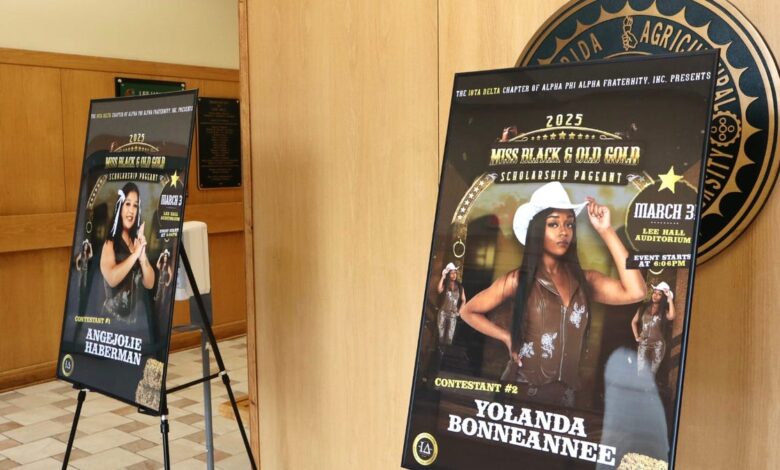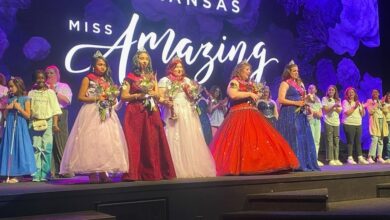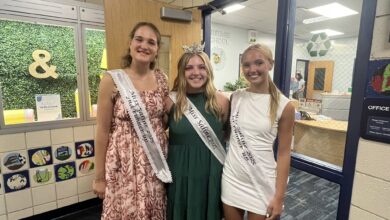Miss Black and Old Gold Pageant uplifts and empowers women at FAMU

Adorned in western regalia, the women of the Miss Black and Old Gold Scholarship Pageant competed fearlessly and flawlessly for the crown on March 31 at Florida A&M University (FAMU), hosted by the Iota Delta chapter of the Alpha Phi Alpha Fraternity, Inc. chartered at FSU.
The event was held in Lee Hall Auditorium on FAMU’s campus, bringing together friends, family and students from both FAMU and FSU, as well as members from multiple Greek organizations to support the contestants.
The pageant, a tradition started in 1976, strives to uplift women who have made strides to be leaders in their community through education, empowerment and confidence. The scholarship is meant to help its sole winner achieve their goals throughout their time at FSU and beyond.
Each of the nine contestants competed in the talent, runway and career categories, where they revealed their aspirations, identity and what brought them to the stage.
“The Miss Black and Old Gold Pageant holds deep significance for Alpha Phi Alpha Fraternity, Inc., as it serves as meaningful way for us to positively influence the lives of young women in our community,” the fraternity said in a statement to the FSView. “This annual event allows us to play an active role in fostering professionalism, leadership and personal growth, while also awarding scholarship funds to support their bright future.”
During the competition, each candidate embodied their identity, culture and goals. In the runway category, the women swept across the stage in outfits representing either their professional goals or their heritage. Ensembles included a bedazzled park ranger, a hand-sewed seamstress apron and Lady Justice herself, clad with a sword and perfectly balanced scales.
During the talent section, contestants showcased their special skills through dance routines, violin performances, spoken word and songs. One standout performance was from Florida State’s own Bailey Marie Osceola Latchford, a national anthem singer at many FSU athletic events, who performed “Landslide” by Fleetwood Mac in a traditional Seminole tribe skirt.
In between categories, the Alphas also brought the audiences together through line dancing and performing their own strolls throughout the aisles. Clad in their classic black suits, they affirmed the importance of the pageant to the community and FAMU.
The pageant serves as an opportunity to uplift women and showcase talents, dedication and achievement that often go unnoticed.
Many contestants were vulnerable enough to share the struggles that they had to overcome to make it onto the runway and succeed along their academic journey. The contestants opened up about their inspirations and motivations to strive for excellence. Many of the contestants are first-generation students or women of color who want to see greater opportunities for their community.
Shekena Mompremier, who won the title of Miss 1906, expressed how the pageant motivated her in times of struggle.
“Taking home the first ever Miss 1906 crown has meant more to me than words can fully express…in the midst of grief, a recovering ACL injury and emotional battles, I chose to show up for myself,” Mompremier said. “Winning Miss 1906 is not just a personal victory, but a symbol that even through the darkest seasons, something beautiful can still bloom.”
Contestants additionally promoted a platform of the change they wish to see at their university and in Tallahassee, furthering their service beyond campus through mentorship programs for future criminologists and mental health advocacy.
Out of the nine contestants, Gabrielle Nonor, a second-year human development and family sciences major, earned the tiara for Miss Black and Old Gold on a platform of empowering women to embrace self-love and value their individuality.
“Once upon a time, I believed I had to be someone I was not in order to make it far in life and to be liked,” Nonor said. “Being your unapologetic, true self opens up so many doors for you and also brings the right kinds of people towards you.”
Pageants hold a stigma for objectifying women and pitting them against each other in a superficial competition. Nonor affirms that pageantry also gives way for women to own what it means to be a woman, regardless of shape, size or color.
“It’s important to continue this tradition every year because it uplifts and empowers underrepresented women such as myself,” Nonor said. “It gives us an opportunity to be recognized and celebrated for who we authentically are.”
Source link




